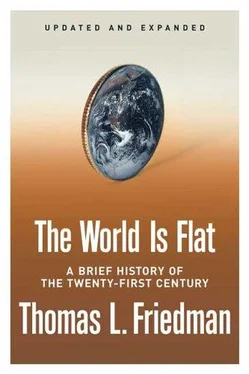Clearly, foreign-born parents seem to be doing this better. “About one-third of our students have an Asian background or are recent immigrants,” he said. A significant majority of the students coming to Caltech in the engineering disciplines are foreign-born, and a large fraction of its current faculty is foreign-born. “In biology, at the postdoc level, the dominance of Chinese students is overwhelming,” said Baltimore. No wonder that at the big scientific conferences today, a majority of the research papers dealing with cutting-edge bioscience have at least one Chinese name on them.
My friends Judy Estrin and Bill Carrico have started several networking companies in Silicon Valley. At one time, Judy was chief technology officer for Cisco. I sat with them one afternoon and talked about this problem. “When I was eleven years old,” said Bill, “I knew I was going to be an engineer. I dare you to find an eleven-year-old in America who wants to be an engineer today. We've turned down the ambition level.”
Added Judy, “More of the problem [can be solved by good] parenting than can be solved from a regulatory or funding move. Everyone wants to fund more of this and that, but where it starts is with the parents. Ambition comes from the parents. People have to get it. It will probably take a crisis [to get us refocused].”
In July 2004, comedian Bill Cosby used an appearance at Jesse Jackson's Rainbow/PUSH Coalition & Citizenship Education Fund's annual conference to upbraid African-Americans for not teaching their children proper grammar and for black kids not striving to learn more themselves. Cosby had already declared, “Everybody knows it's important to speak English except these knuckleheads. You can't be a doctor with that kind of crap coming out of your mouth.” Referring to African-Americans who squandered their chances for a better life, Cosby told the Rainbow Coalition, “You've got to stop beating up your women because you can't find a job, because you didn't want to get an education and now you're [earning] minimum wage. You should have thought more of yourself when you were in high school, when you had an opportunity.”
When Cosby's remarks attracted a lot of criticism, Reverend Jackson defended him, arguing, “Bill is saying, let's fight the right fight. Let's level the playing field. Drunk people can't do that. Illiterate people can't do that.”
That is right. Americans are the ones who increasingly need to level the playing field-not by pulling others down, not by feeling sorry for ourselves, but by lifting ourselves up. But when it comes to how to do that, Cosby was saying something that is important for black and white Americans, rich and poor. Education, whether it comes from parents or schools, has to be about more than just cognitive skills. It also has to include character building. The fact is, parents and schools and cultures can and do shape people. The most important influence in my life, outside of my family, was my high school journalism teacher, Hattie M. Steinberg. She pounded the fundamentals of journalism into her students-not simply how to write a lead or accurately transcribe a quote but, more important, how to comport yourself in a professional way. She was nearing sixty at the time I had her as my teacher and high school newspaper adviser in the late 1960s. She was the polar opposite of “cool,” but we hung around her classroom like it was the malt shop and she was Wolfman Jack. None of us could have articulated it then, but it was because we enjoyed being harangued by her, disciplined by her, and taught by her. She was a woman of clarity and principles in an age of uncertainty. I sit up straight just thinking about her! Our children will increasingly be competing head-to-head with Chinese, Indian, and Asian kids, whose parents have a lot more of Hattie's character-building approach than their own American parents. I am not suggesting that we militarize education, but I am suggesting that we do more to push our young people to go beyond their comfort zones, to do things right, and to be ready to suffer some short-run pain for longer gain.
I fear, though, that things will have to get worse before they get better. As Judy Estrin said, it will probably take a crisis. I would simply add: The crisis is already here. It is just playing out in slow motion. The flattening of the world is moving ahead apace, and barring war or some catastrophic terrorist event, nothing is going to stop it. But what can happen is a decline in our standard of living, if more Americans are not empowered and educated to participate in a world where all the knowledge centers are being connected. We have within our society all the ingredients for American individuals to thrive in this world, but if we squander those ingredients, we will stagnate.
I repeat: This is not a test. This is a crisis, and as Paul Romer has so perceptively warned, “A crisis is a terrible thing to waste.”
Developing Countries and the Flat World
NINE: The Virgin of Guadalupe
It's not that we are becoming more Anglo-Saxon. It's that we are having an encounter with reality.
—Frank Schirrmacher, publisher of the German newspaper Frankfurter Allgemeine Zeitung, commenting to The New York Times about the need for German workers to retool and work longer hours
Seek knowledge even unto China.
—saying of the Prophet Muhammad
The more I worked on this book, the more I found myself asking people I met around the world where they were when they first discovered that the world was flat.
In the space of two weeks, I got two revealing answers, one from Mexico, one from Egypt. I was in Mexico City in the spring of 2004, and I put the question on the table during lunch with a few Mexican journalist colleagues. One of them said he realized that he was living in a new world when he started seeing reports appearing in the Mexican media and on the Internet that some statuettes of Mexico's patron saint, the Virgin of Guadalupe, were being imported into Mexico from China, probably via ports in California. When you are Mexico and your claim to fame is that you are a low-wage manufacturing country, and some of your people are importing statuettes of your own patron saint from China, because China can make them and ship them all the way across the Pacific more cheaply than you can produce them, you are living in a flat world.
You've also got a problem. Over at the Central Bank of Mexico, I asked its governor, Guillermo Ortiz, whether he was aware of this issue. He rolled his eyes and told me that for some time now he could feel the competitive playing field being leveled-and that Mexico was losing some of its natural geographic advantages with the U.S. market-by just staring at the numbers on his computer screen. “We started looking at the numbers in 2001 -it was the first year in two decades that [Mexico's] exports to the U.S. declined,” said Ortiz. “That was a real shock. We started reducing our gains in market share and then started losing them. We said that there is a real change here... And it was about China.”
China is such a powerhouse of low-cost manufacturing that even though the NAFTA accord has given Mexico a leg up with the United States, and even though Mexico is right next door to us, China in 2003 replaced Mexico as the number two exporter to the United States. (Canada remains number one.) Though Mexico still has a strong position in big-ticket exports that are costly to ship, such as cars, auto parts, and refrigerators, China is coming on strong and has already displaced Mexico in areas such as computer parts, electrical components, toys, textiles, sporting goods, and tennis shoes. But what's even worse for Mexico is that China is displacing some Mexican companies in Mexico, where Chinese-made clothing and toys are now showing up on store shelves everywhere. No wonder a Mexican journalist told me about the day he interviewed a Chinese central bank official, who told him something about China's relationship with America that really rattled him: “First we were afraid of the wolf, then we wanted to dance with the wolf, and now we want to be the wolf.”
Читать дальше












